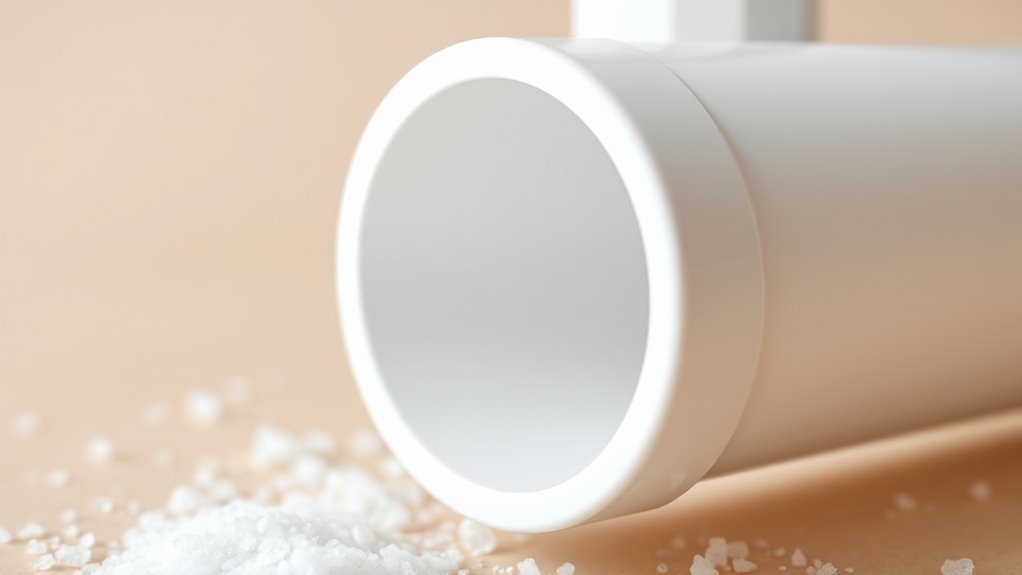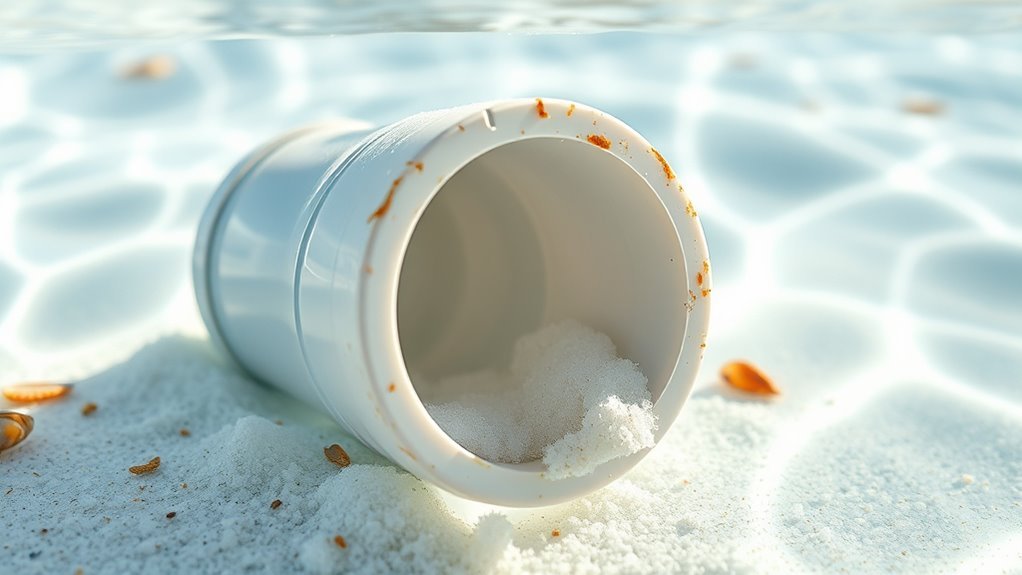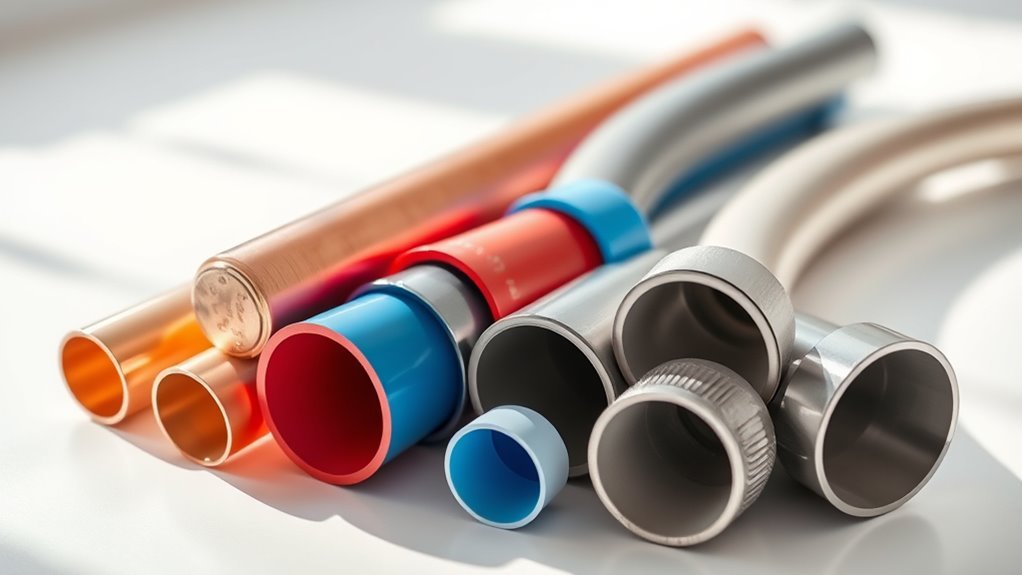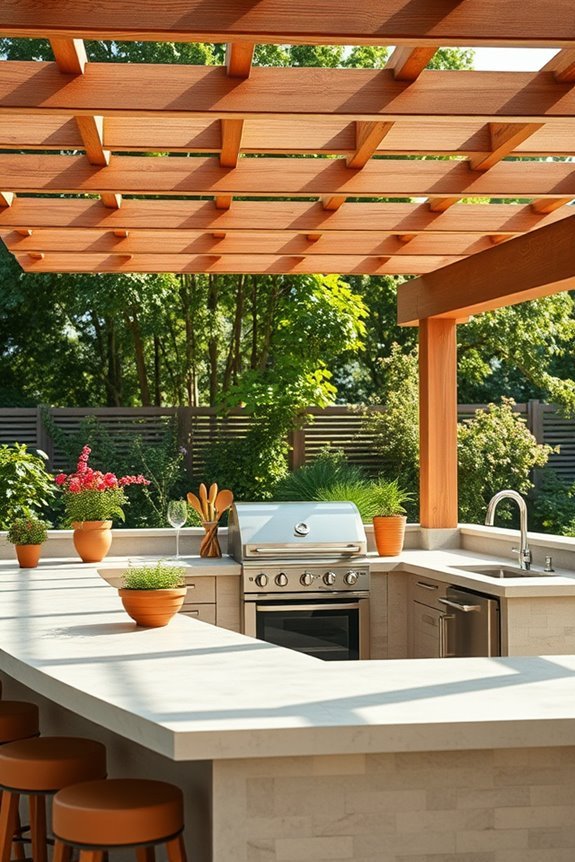Will Salt Damage PVC Pipe? Effects of Saltwater on PVC Plumbing
Saltwater can damage PVC pipes over time. The corrosive nature of salt can weaken the pipes, as chloride ions disrupt the chemical bonds in PVC, leading to brittleness and cracks. Additionally, saltwater exposure can promote corrosion and microbial growth, further deteriorating the material. To protect your PVC plumbing from these effects, regular maintenance and inspections are essential. Understanding how saltwater affects PVC can help ensure the long-term reliability of your plumbing system.
Understanding PVC Pipes

PVC pipes are known for their durability and corrosion resistance, making them a popular choice for plumbing and construction. Made from polyvinyl chloride, these lightweight and flexible pipes come in various grades for specific applications like drainage, pressure systems, and electrical conduits.
Their smooth interior surfaces enhance fluid flow by reducing friction loss.
However, it’s crucial to consider environmental factors, such as exposure to saltwater, which can affect PVC’s long-term performance.
For optimal use, always assess the specific conditions of your application to ensure the right type of PVC pipe is selected.
Properties of PVC Materials
PVC materials are favored for a variety of applications due to their key properties. They are lightweight, making them easy to handle and transport.
PVC also offers excellent chemical resistance, ensuring it can withstand exposure to various substances without degrading. Its durability ensures long-lasting performance, whether indoors or outdoors.
Additionally, PVC is non-conductive, enhancing safety in electrical applications, and has good thermal stability for use in various temperature ranges.
It can be easily molded and fabricated into different shapes, meeting diverse industrial and residential needs. These attributes make PVC an ideal choice for plumbing and many other uses.
How Saltwater Affects Plumbing Systems
Saltwater can severely damage plumbing systems due to its corrosive nature.
This corrosion can weaken pipes, leading to leaks and system failures over time.
To ensure the reliability of your plumbing, it’s crucial to implement long-term maintenance strategies that address these challenges.
Regular inspections and using corrosion-resistant materials can help protect your plumbing from saltwater damage.
Corrosion Risks Explained
Saltwater significantly contributes to corrosion in plumbing systems by introducing sodium chloride, which accelerates the corrosion process in metals.
The ionic nature of salt enhances water conductivity, increasing the risk of galvanic corrosion, especially when different metals are in contact.
Furthermore, saltwater creates a corrosive environment that can lead to pitting and localized corrosion, particularly in stagnant areas.
Over time, these issues can weaken metal components, resulting in leaks and failures.
To protect your plumbing system, it’s crucial to understand these corrosion risks and implement preventive measures.
Impact on Pipe Integrity
Saltwater can severely compromise the integrity of plumbing systems using PVC pipes. It can cause physical degradation through osmosis, leading to increased brittleness and making pipes more vulnerable to cracking and failure.
The additives in PVC may also be adversely affected by salt, further impacting the material’s strength. Additionally, salt attracts moisture, increasing the risk of mold and mildew in the plumbing system.
Therefore, it’s crucial to consider these factors when using PVC pipes in environments exposed to saltwater to ensure durability and performance.
Long-Term Maintenance Considerations
Long-term maintenance of PVC plumbing systems in saltwater environments is crucial to prevent costly issues.
Here are key maintenance tips to ensure your system remains in good condition:
- Routine Inspections: Regularly check for wear, corrosion, and leaks, particularly at joints and connections.
- Cleaning: Remove salt deposits and marine growth to maintain proper flow and prevent blockages.
- Protective Coatings: Use appropriate coatings to improve resistance against saltwater damage.
- Replacement Planning: Schedule pipe replacements proactively to avoid unexpected failures.
Chemical Composition of Salt
Salt, or sodium chloride (NaCl), is a compound made from sodium (Na) and chlorine (Cl) through an ionic bond.
Found abundantly in seawater and mineral deposits, salt has a cubic crystalline structure where each sodium ion is surrounded by six chloride ions.
It dissolves easily in water, breaking into its ions, which are essential for many biological and chemical processes.
Besides its culinary uses, salt is crucial in industrial applications like water treatment and de-icing.
Understanding its chemical composition is important, especially regarding its effects on materials like PVC plumbing.
Corrosion and Its Impact on Pipes
Saltwater corrosion significantly threatens the integrity of pipes, especially those made from PVC.
When saltwater interacts with pipe materials, electrochemical reactions occur, leading to degradation over time.
To ensure long-term durability and performance, it’s crucial to understand how saltwater corrosion works and what measures can be taken to protect your pipes.
Saltwater Corrosion Mechanism
Saltwater can significantly degrade PVC pipes over time due to several key factors:
- Chloride Ion Penetration: Chloride ions from saltwater weaken the chemical bonds in PVC, compromising its structural integrity.
- Hydrolysis: Exposure to saltwater can trigger hydrolysis, leading to the breakdown of polymer chains within the pipe.
- Microbial Growth: Saltwater environments can promote microbial activity, which can further accelerate the degradation of PVC.
- Temperature Influence: Higher temperatures can speed up chemical reactions, worsening the corrosion process.
Understanding these factors is crucial for assessing the durability of PVC plumbing systems in saltwater environments.
If you’re dealing with PVC pipes in such conditions, consider these corrosion mechanisms for maintenance and replacement planning.
Long-term Pipe Integrity
Long-term integrity of PVC pipes in saltwater environments can be severely affected by corrosion due to chlorides. This degradation can lead to cracks, leaks, and system failures, often without visible signs of damage.
Factors like temperature changes and pressure fluctuations can worsen the situation. To ensure the longevity of your PVC plumbing systems in harsh conditions, regular inspections and maintenance are crucial for early detection of corrosion and timely corrective actions.
Saltwater Exposure: A Risk Assessment

Understanding the Risks of Saltwater Exposure to PVC Pipes
If you’re considering using PVC pipes in saltwater environments, it’s important to be aware of the potential risks that can affect their integrity and performance.
Here are the key factors to consider:
- Corrosion Risk: Saltwater can increase corrosion in metal fittings connected to PVC pipes, which may lead to leaks or failures.
- Pressure Fluctuations: Exposure to saltwater can change pressure levels in your plumbing system, heightening the risk of leaks.
- Microbial Concerns: The saline environment can foster bacteria growth, potentially damaging the pipe surfaces over time.
- Thermal Expansion: Saltwater retains heat, which can cause PVC materials to expand, leading to structural issues.
Environmental Conditions and PVC Durability
Environmental conditions significantly affect the durability of PVC pipes, especially when exposed to saltwater.
Saltwater can accelerate corrosion, leading to structural weaknesses over time.
Temperature fluctuations can further compromise the integrity of these pipes.
When selecting and maintaining PVC pipes, it’s essential to consider these factors to ensure longevity and reliability in your applications.
Saltwater Corrosion Impact
While PVC pipes are generally resistant to various corrosive agents, saltwater exposure can significantly weaken them over time.
Here are the main effects to be aware of:
- Surface Erosion: Saltwater can erode the surface, creating rough textures that affect performance.
- Chemical Reactions: The presence of saltwater may initiate harmful chemical reactions, degrading the pipe’s polymer structure.
- Increased Brittleness: Extended exposure can make PVC brittle, increasing the risk of cracks.
- Microbial Growth: Saltwater environments can encourage biofilm formation, leading to further deterioration.
To ensure the longevity of PVC plumbing in coastal areas, understanding these impacts is crucial.
Temperature Effects on PVC
Temperature significantly affects the durability and performance of PVC pipes, especially in coastal areas where saltwater exposure and temperature fluctuations are common.
High temperatures can soften PVC, increasing the risk of deformation under pressure, while low temperatures can make pipes brittle, leading to cracking.
Extreme temperature variations may also cause thermal expansion and contraction, potentially resulting in joint failures or leaks.
To ensure reliable plumbing systems, consider local climate conditions when selecting PVC, and use proper installation techniques, such as expansion joints, to address temperature-related challenges.
Long-Term Effects of Salt Exposure
Long-term salt exposure can significantly degrade PVC pipes, impacting their performance and requiring expensive repairs.
Here are the main issues to consider:
- Corrosion of joints: Salt weakens adhesive bonds, leading to leaks.
- Physical brittleness: Ongoing exposure increases the risk of cracks and breaks.
- Surface deterioration: The exterior can develop rough patches, reducing flow efficiency.
- Microbial growth: Saltwater promotes bacteria and other organisms, which can obstruct pipes.
To prevent these issues, regular inspections and maintenance are recommended for PVC pipes exposed to salt.
Alternative Plumbing Materials to Consider

When considering plumbing materials that withstand salt exposure, it’s essential to explore alternatives to PVC pipes. Here are some viable options:
- CPVC (Chlorinated Polyvinyl Chloride): Offers better heat resistance and can handle certain chemicals, making it suitable for various plumbing needs.
- Copper Pipes: Known for their durability and corrosion resistance, copper pipes are a long-lasting choice, though they can be pricier and may need professional installation.
- PEX (Cross-Linked Polyethylene): Gaining popularity for its flexibility, resistance to scale and chlorine, and ease of installation, PEX is a great option for many plumbing applications.
- Stainless Steel Pipes: Ideal for areas with high salt exposure, stainless steel provides excellent corrosion resistance for long-term reliability.
Each of these materials has unique benefits that can enhance the durability and effectiveness of your plumbing system.
Signs of Damage in PVC Pipes
Identifying Signs of Damage in PVC Pipes
If you’re concerned about the condition of your PVC pipes, recognizing early signs of damage can help prevent costly repairs.
Here are key indicators to look for, especially in environments exposed to saltwater:
- Cracks or Splits: Look for visible fractures on the surface, which indicate structural weakness.
- Discoloration: A shift in color may suggest chemical reactions impacting the pipe material.
- Leaking Joints: Water leaks at joints often point to compromised seals or connections.
- Sagging or Warping: Changes in shape can signal weakened pipes that may need replacement.
Regularly checking for these signs can help maintain the integrity of your plumbing system.
Preventive Measures for Saltwater Exposure
To effectively protect PVC pipes from saltwater corrosion, consider these essential preventive measures:
- Choose Quality Materials: Opt for high-quality, UV-resistant PVC to enhance durability against salt exposure.
- Proper Installation: Ensure joints are sealed effectively during installation to prevent salt intrusion.
- Regular Maintenance: Conduct routine inspections to catch potential vulnerabilities early.
- Use Protective Coatings: Apply coatings or wraps designed for saltwater environments to further safeguard your pipes.
- Redirect Drainage: Direct drainage away from PVC installations to minimize contact with saltwater.
- Educate Yourself: Understand the risks of saltwater exposure to take proactive steps in maintaining your plumbing system.
These measures will help extend the life of your PVC pipes in saltwater environments.
Repairing Damaged PVC Plumbing
If you’re dealing with damaged PVC plumbing, especially from saltwater exposure, it’s crucial to understand the repair options available.
Here’s a quick guide to help you:
- PVC Cement: Use this for small cracks and leaks. It’s a straightforward solution that can quickly seal minor issues.
- Cutting Out Damaged Sections: For more significant damage, you’ll need to remove the affected pipe and replace it with new PVC pieces. Make sure to measure accurately for a proper fit.
- Repair Sleeves: These can be effective for minor leaks. Simply place the sleeve over the leak to reinforce the pipe.
- Consult a Professional: If the damage is extensive, hiring a plumber ensures that the repair is done correctly and safely.
Timely repairs are key to preventing further damage and maintaining the plumbing system’s integrity.
Best Practices for Saltwater Environments
In saltwater environments, regular maintenance of PVC pipes is crucial for their longevity.
To minimize damage from salt exposure, use corrosion-resistant materials.
These practices help maintain plumbing system integrity in coastal areas.
Regular Maintenance Schedule
Regular Maintenance for PVC Pipes in Saltwater Environments
Maintaining PVC pipes in saltwater environments is essential for ensuring their longevity and performance. Here’s a concise maintenance guide:
- Conduct Regular Inspections: Regularly check for wear, leaks, and corrosion, especially at joints and connections.
- Clean Thoroughly: Remove salt deposits and debris to keep water flowing smoothly and prevent buildup.
- Monitor Water Pressure: Ensure water pressure stays within safe limits to reduce stress on the pipes.
- Make Immediate Repairs: Quickly address any issues to avoid further damage and expensive repairs.
Use Corrosion-Resistant Materials
Choosing the right materials for plumbing systems in saltwater environments is crucial for durability and longevity.
For optimal corrosion resistance, consider using CPVC (chlorinated polyvinyl chloride) or fiberglass-reinforced plastic (FRP), as these materials excel in saltwater conditions.
Additionally, stainless steel grades 316 and 317 are highly recommended for their exceptional resistance to rust and degradation.
Regular checks on material compatibility with the environment can prevent costly repairs.
Case Studies: PVC Pipe in Saltwater Applications
If you’re considering using PVC pipe in saltwater environments, it’s essential to understand its performance based on various case studies. Here are the key insights:
- Corrosion Resistance: PVC pipe resists corrosion significantly better than metal pipes, making it a preferred choice for saltwater applications.
- Flexibility and Durability: PVC maintains its structural integrity in dynamic marine conditions, which is crucial for long-term performance.
- Potential for Degradation: Be aware that prolonged saltwater exposure can lead to plasticizer leaching, which may reduce the pipe’s lifespan.
- Environmental Factors: Variations in temperature and salinity can affect PVC’s performance, so it’s important to evaluate these conditions at your specific site.
Expert Recommendations on PVC and Saltwater
When considering PVC pipe for saltwater environments, it’s crucial to assess the specific conditions, such as temperature changes and salt concentration.
Experts recommend selecting high-quality PVC materials designed for marine use to ensure durability against corrosion.
Regular inspections for signs of damage like pitting or cracking are essential.
Using protective coatings can further safeguard against saltwater exposure.
Proper installation practices, including ensuring joint integrity and sealing, are vital to prevent water infiltration.
Following these best practices will enhance the longevity and performance of PVC piping systems in saltwater applications.
Conclusion
Saltwater can potentially damage PVC pipes over time due to its corrosive properties. While PVC is generally resistant to many chemicals, prolonged exposure to saltwater can lead to deterioration, particularly in the joints and fittings. To protect your plumbing system, it’s important to take preventive measures. Regularly inspect your pipes, ensure proper installation, and consider using salt-resistant materials if your plumbing is frequently exposed to saltwater. By following these guidelines, you can help maintain the integrity of your PVC plumbing and avoid costly repairs.


